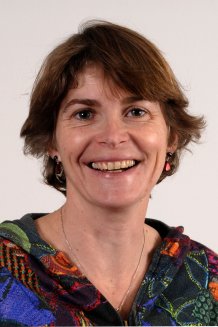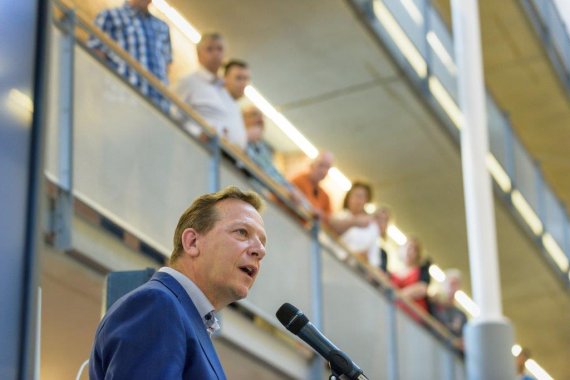ESG director Bram de Vos: ‘The top sectors hardly ever ask for nature or climate research – and EU projects often make a loss.’ Photo: Guy Ackermans
How did the big shortfalls come about?
‘Our main client, the government, gives us fewer and fewer assignments. The ministry of Economic Affairs has transferred millions to the top sectors, but they hardly ever want nature and climate research. To compensate for that we have started doing more international projects, especially in the EU. But most EU projects only cover 70 percent of the research costs: they are not cost-covering without co-financing. Many EU projects at our institute made a loss last year.’
Are the researchers just too expensive?
‘Wageningen Environmental Research has the highest hourly rate at WUR. So, yes, we are relatively expensive. Since the launch of the Recovery Plan in 2016 we have saved on overhead costs. And a management layer has disappeared from the organization. What is more, we are going to cut our accommodation costs. We are looking into whether we can leave Atlas. But we can’t solve all the problems with lower rates, you know. We cannot and don’t want to compete with consultancy bureaus. We are still too expensive for advisory assignments. We can only earn our added value with our quality and by solving complex integral research questions for which the combined knowledge of WUR comes into its own. We are going all out for that now with five externally oriented research programmes. But we might still have a problem even then. We have to compete with European research institutes which do get good core funding from their national governments and therefore do have co-financing for their EU projects.’
The Nature & Society team is disappearing, and the Biodiversity & Policy, Climate Change, and Water & Food teams are going to have to shrink drastically.
‘Yes, those are teams which work in the area of nature and do a lot of international projects which are not cost-covering. The government has decentralized nature research to the provinces and there still aren’t enough research questions coming from there. And there is no top sector in the field of climate. We are working hard on a relationship with the ministry of Infrastructure & Environment, and expect this ministry to become a more important source of research funding for us in future. But that doesn’t solve the financial problems in the short term. There are other things going on at Wageningen Environmental Research too, though. There are opportunities in both the private and government markets for all the teams, but we need to get out more and become more client-centred and enterprising. In recent years we’ve focused largely on the individual staff productivity. Now we want to change tack. We’ve got to look more at what staff can contribute to team performance.’
Just in this phase Operations director Inge Grimm left quite abruptly. When she was appointed last year precisely to implement the Recovery Plan.
‘Inge found a great new job. Her quick exit is a personal issue which I can’t say anything about. There is a good handover dossier, and we must look for a successor fast.’
Is the ESG still a nice place to work?
‘These cutbacks are not nice at all, but I do believe in taking this route to get the institute back on its feet again. The content and relevance of our professional field, and the tremendous commitment of our staff give me energy. And in the organization I sense a lot of understanding for the steps we are taking.’
‘Mainly young, good people are going’
How do the staff in Gaia and Lumen see the persisting financial problems and the implementation of the Recovery Plan at Wageningen Environmental Research? Resource asked Tia Hermans and Marieke de Lange.
Hermans works in the Regional Development and spatial use team and watched last year as about seven of her teammates left voluntarily. ‘And the awful thing is: they are mainly young and good people who leave. They have all found a nice new job.’

‘Involving businesses is not easy’ – Tia Hermans
Meanwhile financing from the ministry of Economic Affairs is still diminishing, notices Hermans, who works a lot in The Hague. ‘We are looking for alternatives, which is not easy. I have tried involving businesses in a project but the response was: come back when it’s up and running. They want to know what the business model is before the research has been done.’
It did become clearer last year that to make a recovery the institute will have to change the way it works. Like the way researchers present their work in The Hague. Hermans: ‘Now we usually produce a report, but what the civil servants want to hear is: what was the result and what does it mean for EZ? And we don’t put that in the report.’ And WUR needs to be more assertive, Hermans thinks: make clear in The Hague that research teams are going to stop if there is no EZ funding.
Making a fuss
Marieke de Lange, who works at Animal Ecology, wholeheartedly agrees. ‘We are not businesslike enough.’ She knows staff who carry on updating their multiannual databases during working hours, even though EZ has stopped financing them, ‘because it is so important’. De Lange: ‘That’s not on, from a business point of view, but nobody confronts them about it.’ It would be better to go to the client and make a big fuss, she thinks.

‘We are not businesslike enough’ – Marieke de Lange
Last year De Lange took a training course called ‘The Choice: steering and letting go’, in which staff discussed how they could work more effectively. ‘Many staff have grown up with individual performance evaluations and targets. During the training course we talked about ways of collaborating and how we could help each other with that. That is now being taken up by the HR department. But these cultural changes go slowly. This is a tough organization.’
But she does notice changes already, for example with the introduction of programme leaders. ‘Every programme now has a leader who goes out to see the clients. And keeps an eye on whether enough profitable projects are being acquired, so that there is also space for strategically important projects which are not cost-covering. That is very much needed because until recently everyone said that non-cost-covering research must go on regardless.’

